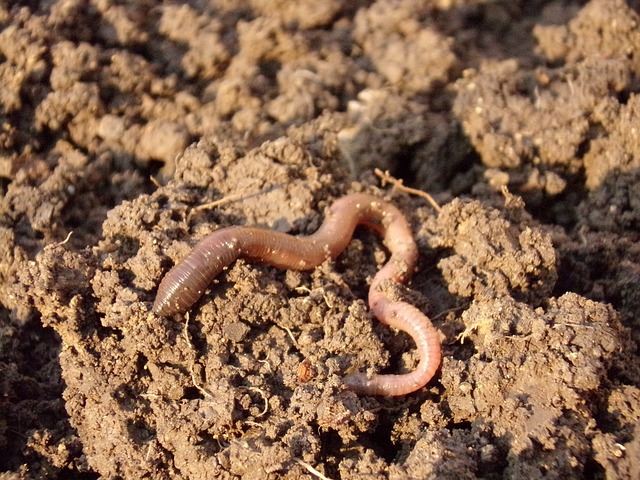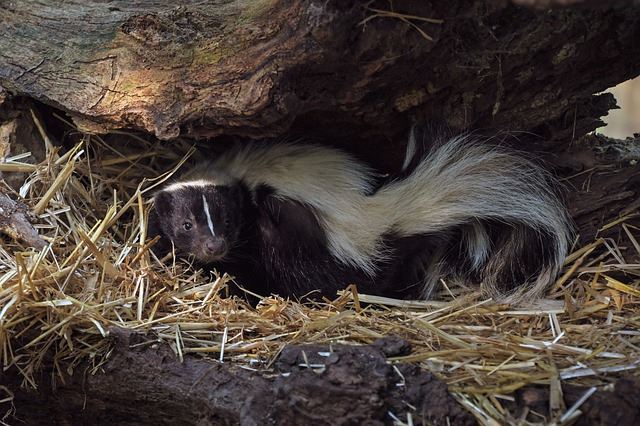Skunks stink. Literally. They’re also one of the more common nuisance critters that we frequently see in Charlotte and surrounding areas. So what’s up with skunks? We fielded some of the most common questions people have about skunks, and we have some answers.
SKUNKS HAVE A DIVERSE DIET

Skunks are omnivores, which means that they eat both plant and animals material. The staples of their diet consist of:
- Insects, larvae, earthworms, and grubs
- Rodents
- Reptiles like lizards and snakes
- Birds
- Moles
- Amphibians like salamanders and frogs
- Plants like berries, roots, leaves, and grasses
So what does that have to do with you? In urban and populated areas, skunks will eat trash and are even known to break into homes to eat pet food.
SKUNKS DON’T HIBERNATE
But they do go into a period of what is called “dormancy” (torpor). This doesn’t occur often in the Charlotte region, but during very cold time periods, in colder months, it can. In this state, skunks fall into a deep sleep in which their body temperatures drop and their metabolism slows significantly to conserve energy. However, skunks will intermittently reawaken if the weather becomes warm enough.
SKUNKS SOMETIMES DEN NEAR HUMANS

Skunks burrow underground and live in what is called “dens”. These dens are year-round homes that skunks utilize for resting, hiding, birthing, and raising their young. Common places that skunks will burrow a den that can be problematic for humans include:
- Under piles of wood
- In crawl spaces
- Under sheds and decks
- In garages
- Under concrete slabs
KEEPING SKUNKS AWAY (HUMANELY)
So skunks sometimes den near humans. What can you do to keep them off of your property without causing them harm? There are a few precautions you can take:
- Remove attractants around the house. Secure your trash, cover window wells, and feed pets indoors.
- Keep garages and sheds shut tight. Because they are easy shelter, sheds and garages can be appealing to a wandering skunk. Be sure to keep shed and garage doors securely closed when you aren’t in their vicinity. Be cautious in the use of “doggie doors” because unintended animals can easily enter here also!
- Fill empty dens. If you find a hole that appears to be the entrance to a skunk den, loosely fill it with soil, leaves, or crumpled paper. Check on the den 2-3 days later, and if you see the filling still undisturbed, it is safe to assume no skunks are living in the den. In this case, you can move forward with filling the den and preventing a future skunk (or other critters) from easily repurposing the empty den as their home.
- Exclusion. Make sure foundation vents and crawlspace/ basement doors are intact and proper-fitting. Install mesh barriers around low decks and buildings to prevent skunks from easily entering and taking up residence underneath.
- Contact a professional. If you’re already dealing with a skunk situation, taking your own measures may not be the most effective solution. Contacting a professional wildlife removal company will help ensure the situation is handled safely and legally.
WHAT IF A PERSON OR PET IS SPRAYED BY A SKUNK?
Getting sprayed by a skunk is an almost cartoonish sort of nightmare, and having a dog or other pet get hit with skunk spray can be a massive pain. According to the University of Nebraska-Lincoln, the following measures can help to get rid of that persistent skunk stink:
- Remove the source of the odor.
- Ventilate the area with fresh air.
- Wash or apply deodorants to the source of the odor.
- Use air fresheners to mask residual odor in the air.
- Use laundry detergent to remove residual odor in fabrics.
So that’s it? That’s all you can do? No! There is actually a special solution that can neutralize the skunk odor that is safe for use on both humans and pets:
- 1 quart of 3% hydrogen peroxide
- ¼ cup of baking soda
- 1-2 teaspoons of liquid dish soap
Mix these ingredients in an open container and use them immediately; storing this concoction in a closed container can create pressure that causes the container to explode. Also, be sure to keep this concoction away from your or your pet’s eyes and mouth when applying.
FINDING SKUNK REMOVAL IN CHARLOTTE, NC, AND SURROUNDING AREAS
If you need skunk removal or other wildlife removals in Charlotte, NC, and surrounding areas, City Wide Exterminating can help! We offer a full array of wildlife control services beginning with an inspection and the legal, licensed removal of wildlife.
We also offer repairs for damage caused by wildlife and for future prevention of wildlife entry. In some cases, City Wide Exterminating offers clean-up services, enzyme sanitation, and deodorization. Just get in touch with us to get a quote!